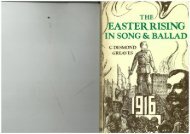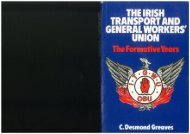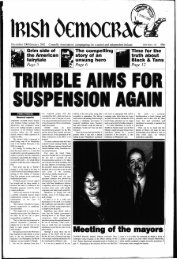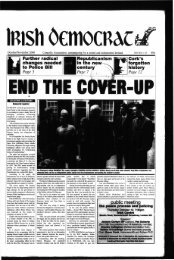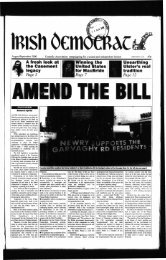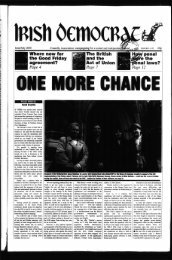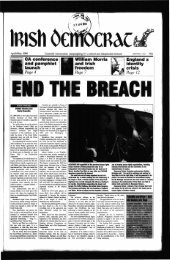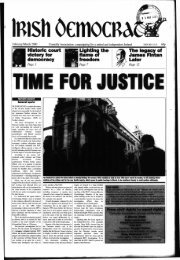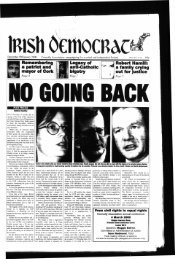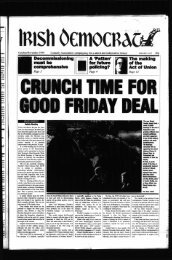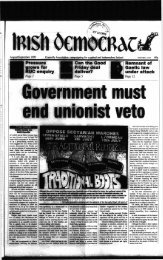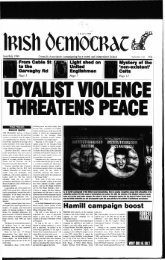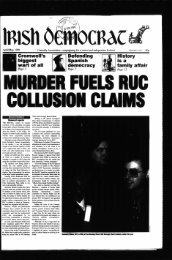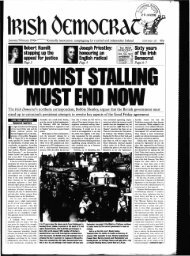You also want an ePaper? Increase the reach of your titles
YUMPU automatically turns print PDFs into web optimized ePapers that Google loves.
No. 226 OCTOBER <strong>1963</strong><br />
ORANGE LETTERS<br />
DISTORT THE FACTS<br />
Play on people's ignorance<br />
IGNS that six-county Labour-Unionists are getting worried<br />
S at the enlightened tendencies in progressive British trade<br />
unions are found in two tetters to the September issue of<br />
"The Draughtsman," monthly journal of the important technicians'<br />
union, D.A.T.A.<br />
One of these complains that a describes himself as its "Modera-<br />
"Presbyterian clergyman" was set tor". As has been pointed out he<br />
on by a crowd of Catholics and was never ordained in the Presbeaten<br />
up.<br />
byterian Church.<br />
in July he was fined £10 with<br />
the alternative of two months' imprisonment<br />
for organising a procession<br />
without giving due notice<br />
to the authorities.<br />
Thus is not allowed in Northern<br />
Ireland though legal in Britain. .<br />
The object of th$ procession was<br />
to protest against Untoa Jfcck<br />
being flown at haif-ihast' over Bellast<br />
City Hall after .the death of<br />
the late Pope John XXIII.<br />
At first he was going tp appeal,<br />
and then said he would not do so<br />
and would go to jail rather than<br />
pay the fine.<br />
UNIONISTS BREAK WORD<br />
Lobby of Westminster<br />
SEAN CONNOLLY<br />
IC.A. CAPTAIN,<br />
Killed Easter Monday,<br />
(See Pa*e Pour)<br />
Parliament<br />
VA/ITH the release of Messrs. David O'Connell and James O'Hagan from Belfast<br />
* * jail, tire number of political prisoners has been reduced to six.<br />
jail,<br />
P. hits at<br />
cial Powers<br />
Birmingham Members<br />
ol Parliament sent messy<br />
ol support to the Wolfe<br />
ommemoration held in<br />
.gham Bull Ring on Seplst.<br />
were Mr. Julius Silverman<br />
Denis Howell,<br />
letter Mr. Howell said<br />
freedom of political expresis<br />
an elementary right of all<br />
The 'presbyterian" was actually<br />
LOUD-HAILER<br />
Mr. Ian Paisley's Lieutenant, .Mr. His lieutenant. Mr. Wyli<br />
Wylie. Mr. Ian Paisley is of Bap- described by the "Draughts]<br />
tist origin, but started an inde- correspondent as "preachinl<br />
pendent mission some years ago,the open air." What he is<br />
and more recently founded the reported to have done is to go nio<br />
Free Presbyterian Church of a 100 per cent, nationalist<br />
Ulster'' which has nothing what- and speak through a loud-1<br />
soever to do with the Presbyterian so that Catholic youths at<br />
Church in Ireland or Scotland. He ball match some distance<br />
qould hear him.<br />
Two .visitors who went tl<br />
PA ISLEY'S flNE m- m<br />
the<br />
went to" a<br />
service<br />
<strong>Democrat</strong>"<br />
in<br />
that<br />
Mr. Paisley's<br />
they<br />
church<br />
PAID<br />
and heard him describe the Catholic<br />
UR Church as the "red whore of<br />
IAN PAISLEY will not go<br />
'' to jail after all.<br />
Rome." A leaflet in the Associa-<br />
FU<br />
si on<br />
men," and "I am pleased to give<br />
my support particularly in rwpect<br />
tion's possession bearing the of the Special powers in Northern<br />
names of Mr Paislev and Mr. j Ireland which I regard as offensive<br />
Wylie says "Ulster Protestants, let<br />
your answer to Popery be no surrender."<br />
''It is not therefore surprising<br />
that members of this sect meet<br />
with hostility in Catholic areas,<br />
especially when you remember all<br />
that the Catholics have gone<br />
through<br />
Nevertheless the campaign for the final release of these<br />
needs to be stepped up.<br />
It is known that the Stormont six counties on St. Patrick's Day,<br />
Government blatantly broke its Mr. Faulkner sent for representatives<br />
of the prisoners and pro-<br />
word over the question of the<br />
prisoners.<br />
mised them that if the demonstrations,<br />
which might have rocked<br />
When th* Hue demonstrations the Government, were called off,<br />
were being organised all over the all the prisoners would be out<br />
within six months.<br />
to civil liberties."<br />
The meeting was preceded bv a<br />
March from SparkhiH Park to the<br />
Bull Ring, where it was addressed<br />
by Coun. Mumford, Mr. E. Child<br />
(Bakers' Union). Mr. Desmond<br />
Greaves and Mr. Thomas Redmond.<br />
(Report on Pa«e Eight)<br />
The six months expired on September<br />
17th.<br />
There are still six prisoners in<br />
jail, and the value of the word of<br />
the Unionists is thus exhibited to<br />
the world.<br />
SEEMING SOFT<br />
Reasons for the breach of faith<br />
are matters for speculation.<br />
Some believe that Mr. Faulkner<br />
is trying to oust Captain Terence<br />
O'Neill from the premiership and<br />
•cannot afford to sewn "soft" with<br />
the Republicans while claiming<br />
that the Prime Minister is not<br />
tough enough.<br />
Others think he has been intimidated<br />
by the fire-eating Protestan<br />
RE-ENROLMENT<br />
The Connolly Association is<br />
now re-enrolling its members for<br />
the year 1964.<br />
This is the Association's jubilee<br />
year and members who join or rejoin<br />
will receive instead of tlte<br />
old green and gold card bearing<br />
the head of James Connolly, a<br />
newly-designed card with an engraving<br />
of the General Post<br />
Office.<br />
The engraving is by Mr.<br />
Thomas Redmond, Dublin-born<br />
chairman of the Manchester<br />
Branch.<br />
F 1<br />
1916<br />
tism of Mr. Ian Paisley whose<br />
lieutenants have recently been involved<br />
in disturbances in nationalist<br />
areas.<br />
The Connolly Association is<br />
organising a lobby at Westminster<br />
as soon as Parliament re-aseembtes<br />
with the object of securing pressure<br />
is brought on the six county<br />
Government to release Mallon and<br />
the other men they weu!d like to<br />
hold as hostages.<br />
BOOK<br />
SERVICE<br />
ROM Saturday, 28th September,<br />
readers of the "<strong>Irish</strong><br />
<strong>Democrat</strong>" have been able to purchase<br />
books at the paper's office.<br />
The office is open for this purpose<br />
erery Saturday Irom lr a'.m!<br />
to 1 p.m. and a selection of paper<br />
backs and pamphlets of <strong>Irish</strong> interest<br />
is available.<br />
Among those which aroused<br />
widespread interest are Mr.<br />
Peader O'Donnell's "There will be<br />
another day" just published in<br />
England.<br />
Mr. Joseph Deasv's short life of<br />
Jim Larkin has also gone well.<br />
Among paper backs available<br />
are "Rebel Cork's Fighting Story,"<br />
Desmond Ryan's story of "Sean<br />
Treacy and the Tipperary Brigade."<br />
Tom Barry's Guerilla Days<br />
and "With the IRA. in the fight<br />
for <strong>Irish</strong> Freedom."<br />
Readers in the provinces can<br />
avail of the "<strong>Irish</strong> <strong>Democrat</strong>"<br />
book service which has now been<br />
reinstituted and those interested<br />
should write to 374 Grays<br />
Road for particulars.<br />
Inn<br />
As many people expected before<br />
lie actually went to jail somebody<br />
paid the fine for him, so that he<br />
i still a free man.<br />
IRONICAL<br />
MEMORIES<br />
I)I;RLIN TRADES COUN-<br />
CIL must have had theif 1 !.<br />
1<br />
in their cheeks whehj<br />
organised an "industrial,<br />
' fnl>11ion" to commemorate!<br />
i f at lock-out of 1913 led<br />
>' Connolly and Larkin which<br />
1 ' eight months.<br />
hl ' most titanic industrial<br />
i 1 of the "great unrest" was<br />
miii'Miorated by boosting the<br />
'•mploying class who the<br />
fought fifty years ago. I<br />
Ih.'iue seems to have been that<br />
wl """iis in the past workers had<br />
1<br />
i>Kht for their rights, these<br />
ri '<br />
all that was changed.<br />
Wi,other the Dublin dockers<br />
v >•" were on strike for four weeks -J<br />
«>>:.
2 THE IRISH DEMOCRAT <strong>October</strong> <strong>1963</strong><br />
ANSWERING MR. GRAY<br />
Dear Sir,<br />
READERS<br />
LETTERS<br />
ON AN<br />
IMPORTANT<br />
CONTROVERSY<br />
There are a great number ol Catholics<br />
working at the docks, and indeed working<br />
all their lives as dockers—but always th?v<br />
have been forced to accept the secondclass<br />
status of "casuals." which is really<br />
.no status at all.<br />
Very much the underdog.<br />
the Catholic is effectively excluded<br />
from the privilege of membership of the<br />
dockers" branch by their fellow trade<br />
unionists.<br />
During the past several years the books<br />
agendas of <strong>Irish</strong> conferences is rather<br />
of the 11 10 dockers' branch were opened<br />
_„v<br />
for the admissions of new members on<br />
Uear Sir,<br />
IN reply to the letter from Mr. M.<br />
Gray, published in last month's<br />
"<strong>Democrat</strong>," I'would like to make the<br />
following comments.<br />
While it would<br />
be ideal for pressure to come from<br />
the <strong>Irish</strong> members of British trade<br />
unions living in Ireland, on matters<br />
relating to <strong>Irish</strong> problems, there are<br />
reasons why this is not happening at<br />
present.<br />
But to take the line that<br />
nothing should be done until such<br />
resolutions do start to appear on the<br />
naive<br />
Whether his <strong>Irish</strong> counterpart takes any<br />
action or not, the British worker is still<br />
saddled with the <strong>Irish</strong> question and all<br />
it involves.<br />
While Ireland is partitioned, he as a<br />
taxpayer has to raise £100 million which<br />
it is estimated it costs every year to maintain<br />
the six-county statelet.<br />
He also suffers<br />
an addition to the Tory strength at<br />
Westminster of 12 rabid Northern Ireland<br />
Unionists, and carries the blame for every<br />
denial of civil liberties, and for every dirty<br />
act by the Northern Ireland Government.<br />
The N.U.R. has had no members in Ireland<br />
since its withdrawal on December<br />
31st 1962, yet since that time it has on<br />
different occasions spoken up on behalf<br />
of the <strong>Irish</strong> people and has called for<br />
an enquiry into the Northern Ireland<br />
police state.<br />
Had it been guided by similar<br />
feelings to those of Mr. Gray it would<br />
never have used its influence to demand<br />
the release of the political prisoners, or<br />
to call for an enquiry into the workings<br />
ol the Special Powers Act etc. The British<br />
trade union movement is in many ways<br />
involved in the problems of Northern Ireland.<br />
The refusal of Stormont.to recognise<br />
the Northern Ireland Committee of<br />
the <strong>Irish</strong> Congress of Trade Unions affects<br />
British-based unions as much as<br />
<strong>Irish</strong><br />
ones.<br />
The sections of the Trades Disputes Act<br />
which still operate in Northern<br />
Ireland<br />
also affect British unions with members<br />
in that area.<br />
The British trade unions<br />
affiliated to the National Council for Civil<br />
Liberties are concerned with the religious<br />
and political discrimination and other<br />
denials of civil liberty in the six counties.<br />
Finally if any trouble were to develop<br />
over the "Border issue" it is the sons<br />
of British trade unionists who would have<br />
to die if it came to a shooting match. The<br />
British worker as already stated pays for<br />
two occasions. On each occasion 110 new<br />
full members were enrolled as dockers.<br />
To the best<br />
of my knowledge, out of<br />
those 220 new members, only one was a<br />
Catholic.<br />
Of course, there are a number of more<br />
elderly Catholics who are members of the<br />
11/10 branch—old-stagers who had gained<br />
admission many years ago before the<br />
Orange-discrimination policy was completely<br />
imposed.<br />
But even they find it<br />
impossible even to obtain membership of<br />
the branch for their own sons, although<br />
it is recognised that the son of a docker<br />
has the strongest claim to priority for<br />
admission.<br />
This religious discrimination is. of<br />
course, as always, "explained away" with<br />
all sorts of excuses, and it is pretended<br />
that sectarianism has nothing to do with<br />
it. but the facts speak for themseves.<br />
But worse than that, the dockers'<br />
branch has also been guilty of refusing<br />
to work with fellow-members ol their own<br />
union.<br />
For many years the Transport<br />
Union<br />
operated a system of "second preference"<br />
at the Belfast docks—the "Red Button"<br />
men. These Red Button men were casuals<br />
outside the dockers' branch, but held<br />
membership cards in other branches of<br />
the union. They got second preference<br />
for any jobs going after the Blue Button<br />
men—members of the dockers'<br />
branchhad<br />
all been placed.<br />
Most of the Red Button men had. in<br />
fact, been dock workers for most of their<br />
lives, and a large proportion of them<br />
were Catholics.<br />
Eventually the Red Button<br />
men instituted a move to request the<br />
union for permanent<br />
status as dockers,<br />
in the light of their long service at the<br />
docks, and they sought to secure a certain<br />
consideration for admission to the dockers'<br />
branch when vacancies occurred there.<br />
The dockers' branch resented this move<br />
J S a member ol the Trans-<br />
* port and General Workers' Union,<br />
and an Englishman. I found Bro.<br />
Gray's attitude hard to understand.<br />
He<br />
lives in the United Kingdom and attends<br />
conferences of a British union as a delegate.<br />
As such, he is entitled to move or<br />
speak on any question<br />
on the agenda.<br />
However, lie suggests that the mere English<br />
branches should not put forward<br />
resolutions on Northern Ireland.<br />
Under the existing conditions in<br />
Northern Ireland this would mean that no<br />
resolutions on Northern Ireland would go<br />
forward.<br />
Is that what Bro. Gray desires?<br />
I say that we British trade unionists have<br />
every right as well as the duty to speak<br />
out against<br />
the Northern Ireland police<br />
state.<br />
If Bro. Gray thinks Northern Ireland<br />
is the special preserve of the <strong>Irish</strong><br />
in fact, let him think again.<br />
And who is<br />
in a better position to help the Northern<br />
Ireland <strong>Democrat</strong>s than the British trade<br />
unionist?<br />
Our civil liberties in Britain are constantly<br />
threatened by the British Tories,<br />
and we must fight for civil liberties to be<br />
restored in Northern Ireland in order to<br />
safeguard our own here in Britain.<br />
Therefore<br />
I say there should be more resolutions<br />
on Northern Ireland from British<br />
branches, not fewer.<br />
J. SYMES<br />
Liverpool.<br />
Vtar Sir,<br />
w Y okcovvu. lui uvA-aoio tuaiu.ii icacilbcu U1U) UlC/vc<br />
the upkeep of. "Northern Ireland." and he and subsequently two officials were found<br />
VlQC tVlAfafn, . , _ ...<br />
lias therefore every right to keep an eye<br />
on developments there and to use what<br />
power he can to protect his interests.<br />
In this respect <strong>Irish</strong> workers in Great<br />
Britain should take every opportunity to<br />
get resolutions passed at branch and<br />
district level, on <strong>Irish</strong> matters of mutual<br />
concern. Through the British Labour and<br />
trade union movement they can<br />
arouse<br />
British public opinion to bring about an<br />
end to the partition which hits both the<br />
<strong>Irish</strong> and the British worker and which<br />
is maintained in t.lve interest of a class<br />
which exploits both.<br />
Yours,<br />
THOMAS LEONARD<br />
Surrey.<br />
* * *<br />
Vtar Sir,<br />
guilty by a jury in Belfast high couK of<br />
conspiring to Injure two Red Button men<br />
by depriving them of work at the docks,<br />
and the court ordered them to pay £6,200<br />
to the injured parties.<br />
This court verdict so angered the<br />
dockers' branch that th£v staged a threeday<br />
sLrike against their fellow trade<br />
unionists and later secured the abolition<br />
of tlie second preference system altogether.<br />
Of course, if the English trade unionists<br />
could be told all about this, I suppose<br />
they would And It easier to understand<br />
the strange attitudes taken by delegates<br />
from Belfast en <strong>Irish</strong> matters whan they<br />
are raised at conferences.<br />
The same eert<br />
of thing goes on in the shipyard,<br />
certain trades strtl exclude CatfcaMoe, although<br />
it must he said that very many<br />
good trade unionists are w«iMn« to dis-<br />
>M«2?ii x z e z : z rsjrjrs ^ « -<br />
T.G.WAJ. ophIoi—oo supported the '<br />
policy «f Mowing paaoaful understanding<br />
MMRg nations and that they<br />
"are ateo trying to apply those tame<br />
principle* al home."<br />
It would like to know how they are<br />
going about applying these principles at<br />
home, for I would be interested to hear<br />
ol any practical steps being taken to<br />
secure an end to the religious discrimination<br />
practised by members of his union<br />
in Belfast.<br />
Fee bwtenee, kt is etll knows -that the<br />
11 M anhen' hwdi ef<br />
Union hi Be Meet hat *<br />
sued « peNtv •> ndiaiiit OaMwHos from<br />
at the dockers branch get<br />
autaoMrttc priority in obtaining the beat,<br />
or<br />
of aw Jobs which are available on<br />
any day. and thoor oiltafcle the branch.<br />
the so-called "casuals." must take second<br />
best or often go home without a job at<br />
all.<br />
questions should be left entirely to the<br />
<strong>Irish</strong> membership. Unfortunately too<br />
many progressive trade unionists like Mr.<br />
Gray tend to hush up matters like these<br />
- perhaps because they are ashamed. Or<br />
maybe it is because they are afraid to<br />
tackle such a difficult problem.<br />
His attitude<br />
seems to be conveyed in his sentenoe,<br />
"Would this be good politics?".<br />
But I say it is bad politics to hide these<br />
matters, and they should be fought out<br />
in the open if we really want to do away<br />
•with injustices.<br />
He suggests it is thaw<br />
you "did some really hard thinking "<br />
I<br />
would suggest the same to him.<br />
Yours slnoerely,<br />
BELFAST CASUAL DOCKEd<br />
P S : I enclose my name and details uf<br />
my career so that you can see that I<br />
know what I am talking about, but I<br />
would Ufce you to keep it to youcaeli.<br />
as I do not want to be excluded from<br />
the few jobs which I can manage with<br />
difficulty to obtain at the docks these<br />
days<br />
THE crux of the matter arising from<br />
Malachy Gray's letter is this : who<br />
is entitled to decide whether Britishimposed<br />
partition in Ireland shall be<br />
terminated or not ?<br />
Mr. Gray resented the assertion<br />
that<br />
he was unionist-aligned in his attitude;<br />
but his answer to this question leaves<br />
him no room for complaint.<br />
Mr. Gray seems to believe that the<br />
matter ought to be decided by a section<br />
of Unionist-coerced, or Unionist-befuddled<br />
workers who live in the small north-east<br />
corner of Ireland. "<br />
He would deny not only the rest of Ireland,<br />
but the vast majority of the members<br />
of his own union their rights in this<br />
matter.<br />
Where does his position differ from that<br />
taken up by other such<br />
"anti-unionists"<br />
or "progressives" as Lord Morrison of<br />
Lambeth whose 1949 Ireland Act was<br />
permeated with the same spirit?<br />
Or, for that matter, from the wellremembered<br />
Stormont Unionist Mr. Mc-<br />
Coy. M P., who feared (groundlessly as<br />
it transpired) British democracy in the<br />
shape of tlie last Labour Government?<br />
Does Mr. Gray really mean to assert the<br />
principle that the people of an oppressor<br />
country (e.g., the London branch that<br />
moved the resolution) have no right, regardless<br />
of what the pro-partition minority<br />
in Ireland may think, to remove obstacles<br />
that stand in the way of their own progress?<br />
The fact that pro-partitionists form a<br />
majority<br />
in Mr Gray s particular trade<br />
union in Northern Ireland in no way invalidates<br />
this argument, though admittedly<br />
it makes the situation more complicated<br />
for Mr. Gray.<br />
The British ruling class and its Tery<br />
Government have a very deftnite policy<br />
towards Ireland, namely to keep it dew*<br />
by dhrfattott H. This H a fact.<br />
Why, than,<br />
may the British people net advance<br />
alternatives te this policy?<br />
Mr. Qray himself would make no objection<br />
to alternatives being<br />
advanced to<br />
British policy on world peace, disarmament,<br />
or South Africa.<br />
Then why hush<br />
up Ireland?<br />
In view of the T.Q.W.U.'s power this<br />
controversy is more than academic<br />
Decisions<br />
taken by the T.O.W.U Oonierence<br />
can materially affect Government policy,<br />
whether Labour or Tory.<br />
Quite recently<br />
Mr. Frank Cousins was described as<br />
"threatening NiiJ.C. with atrophy." The<br />
Transport Union has an immense power<br />
to do good, and the London branch's resolution<br />
wmn a praiseworthy attempt to<br />
bring about tbe defeat ol Brrtwh Toryism<br />
and iu six-county adjunct<br />
R. W. MEATLEY.<br />
MMA<br />
SEi BACK PAGE<br />
OTHER LETTERS<br />
\[R K. O Grady's letter i= sonirw!<br />
' " -one-sided." Whatever criticiMr. j>.<br />
may make, the "<strong>Irish</strong> <strong>Democrat</strong>" has din<br />
excellent and courageous work, it ha<br />
helped more than any other journal t<br />
get political prisoners released. :,<br />
prisoners who have been in jail for years<br />
without trial.<br />
Surely O'Grady does m-;<br />
approve of Such imprisonment.<br />
He would<br />
probably be the first to consider it unjiui<br />
if prisoners were kept in jail behind the<br />
Iron Curtain or in Spain, but because the<br />
British do it. he thinks that they can d<br />
no wrong.<br />
Because one works in a partial', a:<br />
country one does not have to be slaveminded<br />
to that country.<br />
The fact that I<br />
work in France and Germany most of the<br />
year doep not mean to say that I am to<br />
be servile to these countries at the expense<br />
of Ireland.<br />
It is up to every <strong>Irish</strong>man to have the<br />
courage to stand up to Britain without<br />
being anti-British.<br />
The "<strong>Democrat</strong>" does<br />
not talk about the oast, but discusses the<br />
present evils of today—partition, the<br />
economical and financial situation which<br />
as it stands today is detrimental to Ireland's<br />
present and future.<br />
Nationalism is not dead today.<br />
It is on<br />
the increase everywhere.<br />
This can be a<br />
good thing so long as countries<br />
respect<br />
each other as they are slowly doing.<br />
Our<br />
future is not only with Britain (God help<br />
us if that were so) but with the whole<br />
world, in the same way as Switzerland<br />
does.<br />
May I finish up by saying long live<br />
the " <strong>Irish</strong> <strong>Democrat</strong>" in<br />
spite of any<br />
faults it may have.<br />
Yours sincerely.<br />
LIAM MULLALLY.<br />
Mentcn, France.<br />
* * *<br />
BRITAIN<br />
BREAKS<br />
AGREEMENT<br />
A CORRESPONDENT in Cork City sends<br />
a copy of the following letter which<br />
has been sent to tha Executive Commit.ae<br />
and branches of the Amalgamated<br />
Engineering<br />
union in Britain.<br />
Apparently<br />
the British Ministry of Pensions has<br />
issued a leaflet denying <strong>Irish</strong> pensionars<br />
their full rights under the agreements<br />
between the two Governments.<br />
While disliking<br />
the references to dying for the<br />
"Commonwealth" as unnecessary, we publish<br />
it willingly.<br />
Indeed it is a double<br />
indictment of tha British Government<br />
that the Cork men have so little confidence<br />
in its sense of fair play that they<br />
should be offering young men's lives (all<br />
the <strong>Irish</strong>men have) in exchange for<br />
money (all tha British Government cares<br />
about).<br />
Not only the members of the A.E.U. to<br />
whom the letter is addressed, but all other<br />
trade unionists will, we hope, go on record<br />
against this discrimination.<br />
DEAR SIR AND BROTHERS,<br />
We the members of the above branch<br />
request the E C. to instruct our brother<br />
members (that are Members of the<br />
House of Commons) to protest against<br />
the Ministry of Peasions and National<br />
Insurance Leaflet No. N.I. 38. which<br />
debars our members and our aged<br />
people from receiving the full rates of<br />
benefits of National Insurance for which<br />
they have paid for during the time they<br />
lived and worked in England and Great<br />
Britain.<br />
We demand that the full rates<br />
and<br />
benefits shall be paid to all our people<br />
and our aged brothers who have returned<br />
to their homes in Ireland to end<br />
their days on this earth.<br />
They have by their labours helped to<br />
build up the wealth and power of the<br />
British Commonwealth and hundreds ol<br />
thousands of our young countrymen<br />
have in the past given their lives in<br />
defence of Qreat Britain and todav<br />
their are thousands of our young men<br />
in ail branches of Her Majesty's armed<br />
forces willing if need be to offer their<br />
young lives in the defence of the British<br />
Commonwealth,<br />
/nd the Ministry of<br />
Pensions repays our people by robbing<br />
them of their full p?nsion rates when<br />
they become aged and unable to work<br />
and deeire to return to their home land<br />
to spend the rest of their lives with<br />
their own people.<br />
WE DEMAND ELEMENTARY<br />
JUS-<br />
TICE FOR AIJj OUR MEMBERS AND<br />
OUR OLD PEOPLE WHO ARE EN<br />
TITLED TO THESE BENEFITS<br />
Sincerely yours,<br />
MEMBERS OP THE<br />
CORK<br />
BRANCH.<br />
<strong>October</strong> <strong>1963</strong> THE IRISH DEMOCRAT 3<br />
THE IRISH<br />
DE/HCCRAT<br />
374 GRAYS INN ROAD<br />
LONDON, W.C.I<br />
Subscription: 8/6 per year<br />
Editor: DESMOND GREAVES<br />
Associate Editor: SEAN REDMOND<br />
WORLD COMMENTARY By PAT DEVINE<br />
DISCRIMINATION MUST GO<br />
A S the glut of H-bombs and other<br />
* nuclear devices multiplies in the<br />
who appeared to suffer in silence, are now<br />
fighting back with all the weapons at<br />
hand, including the state power of many<br />
newly sovereign African states.<br />
Controversy<br />
T HE thrashing oat of policy in the<br />
course of controversy<br />
is an old<br />
tradition of the Labour and National<br />
movements, and is both healthy and<br />
inevitable. The only precaution<br />
necessary is to distinguish clearly between<br />
friends, who must always be<br />
reasoned with, and enemies who<br />
must be fought.<br />
In the large correspondence<br />
triggered<br />
off<br />
by Mr. Gray's letter, of<br />
which a selection is published in this<br />
issue, the differences of opinion revealed<br />
do not merit any strong<br />
language and it is common ground<br />
that Mr. Gray is a respected and<br />
hard-working trade unionist whose<br />
record of service is noteworthy and<br />
well-known.<br />
What then is tire explanation of the<br />
fact that no correspondence has been<br />
received supporting his stand on the<br />
issue of resolutions on Northern Ireland<br />
in British trade unions ?<br />
Most probably it<br />
is that he may<br />
have presented his case a little hastily<br />
and given the Impression of pushing<br />
it too far.<br />
It Is certain that he. gave<br />
the impression to most readers of<br />
wishing to deny British trade unionists<br />
the right to raise issues appertaining<br />
to Northern Ireland in their<br />
branches.<br />
And since the very existence<br />
of Northern<br />
Ireland is due to<br />
an Act of the British Parliament,<br />
which legislates for it<br />
oontinuousiy<br />
and collects M per cent *bt tft'taxation,<br />
it is palpably absurd to deny<br />
the British workers the right to discuss<br />
the results of what<br />
is plainly<br />
British Tory policy.<br />
Recently a group of Nationalist Members<br />
of Parliament approached the British<br />
Hume Secretary to urge an enquiry into<br />
facts of discrimination which they listed<br />
in a memorandum.<br />
Many of those discriminated<br />
against were trade unionists?<br />
Have the British trade unionists no right<br />
to support the demands made by people<br />
who saj? they are suffering as a result<br />
of British Government policy?<br />
i r pHAT said, we can come to the common<br />
* sense withifi Mr. Grav's case, which<br />
is really somewhat obscured by talk of<br />
rights.<br />
While British trade unionists' rights iti<br />
the matter are Incontestable—for what is<br />
at issue te the right to oppose British T6ry<br />
policy, not of<br />
the right to legislate<br />
for the <strong>Irish</strong> nation, for that does not<br />
exist—there is another equally imfjoHafcit<br />
question and that is the manner in tvhich<br />
they exercfte th&se tights.<br />
Clumsy or ill-coftsideted resolutions<br />
passed with the best Intentions In the<br />
world can militate Against the success of<br />
the very thing they are designed to<br />
achieve.<br />
Mr. Gray and his Tellow trade unionists<br />
have local difficulties which are real.<br />
A<br />
trade union movement has been built<br />
up at .great labour and has been kept<br />
united and intact hot without some efforts<br />
al mutual accomrmElation and diplomacy.<br />
That very fact is a contributory factor<br />
i" the unification of the people and ultimately<br />
the unification of the country.<br />
It<br />
i important not to jeopardise \vhat has<br />
tinen achieved by attempts to mov£ too<br />
ta: t.<br />
What would seem necessary, however,<br />
more discussion of Northern<br />
Ireland<br />
'<br />
blems, not less, and in this discussion<br />
i.sh workers will be grateful to Mr.<br />
'' : av and his colleagues for all the exi>'<br />
matory and ecfucative contributions<br />
cftn make.<br />
Hie interest ol British workers In Ire-<br />
*•>
y means of the most infamous;<br />
that It' was accomplished by<br />
bribery,- corruption -and intimidation of<br />
the most infernal-character; that the socalled<br />
insurrection of "94 was promoted by<br />
the English government hy. means of the<br />
most monstrous that are to be found on<br />
the -records of any nation;-and for the<br />
sole purpose of destroytag'the^Hberty -and<br />
-prosperity of that country; - &nd *hat the<br />
union was riot only notaocQtnpltabed with<br />
the consent, bat*8»tnst< the expressed<br />
• wi8h oT foe-<strong>Irish</strong> peoplehiasid/baylng been<br />
accoappUshed-by such meaoMt.naver han,<br />
and never- can be binding-on-the <strong>Irish</strong><br />
population.<br />
"Nor has the. union ever been recognised<br />
by thfr people of that country, and having<br />
been established on the ruins of the<br />
liberty of Ireland, and bjr an alien government,<br />
the act of union was-en act of<br />
usurpatioh on the part'of England, and<br />
the authority claimed in virtue of that<br />
act and-since exercised, can never be other<br />
than auth6rity based on usurpation."<br />
How topical are Sketehley'a words,<br />
when we still see today "t^at authority<br />
based on usurpation" hi full force in the<br />
North.-Ea?t part of Ireland; Sketehley envisaged<br />
not only Irelapd. »»* every country<br />
that was oppressed freed from the curse<br />
ot imperialism, and foresaw, that only in<br />
the independence ;of each country to<br />
manage its. own affeira,;jras .foe true and<br />
only possible basis, of the brotherhood of<br />
foe human, race to be found.<br />
T WONDER If foe l^ient Park Tavern<br />
1<br />
on foe Coventry Road aod the Black<br />
Lion Inn on poles^ill Btree^KMi still in<br />
existence, or whether time lfi-wrf shape<br />
of air-raids or redevelopment jp* conquered<br />
them? In these two -gMftt* did<br />
Sketchley and his friends meet'tb debate<br />
foe topics of foe day. Perhfcpt It would<br />
be a pilgrimage of affection for some<br />
resident of Birmingham ta find out more<br />
about this man who sought Justice for an<br />
oppressed people.<br />
JAMES f. McGILL.<br />
Thanks to these<br />
U/E really need donations to comc<br />
^ in at the rate of £?• a month<br />
to keep the "tiieli <strong>Democrat</strong>" going.<br />
The list given tfefow covers the two<br />
months August and September, and<br />
thus shows us about £8 a month short<br />
of our target. So we hope our good<br />
friends will keep it up and those who<br />
missel us these months will remember<br />
iA <strong>October</strong>:—<br />
Our thank* to i Leo MoCormac, Liam<br />
Mullally 2/3, F. Murray */«, G. Sullivan<br />
£S IBs., South London readers 2/6, L.<br />
Stanley ie/-, P. Cronin P. CSullivan<br />
£i0, 0. J. Lennon i/e, R. Hamilton 19 6,<br />
B. Wilkinson 12/6, J. Walsh 41, T. Co*<br />
£3 ies., East London £2, F. Small 10/-,<br />
G. Curran £2, J. Breen IS?-, May Malone<br />
£1, M. Graham 1/8; total £41 11a. 9d.<br />
<strong>October</strong> <strong>1963</strong> THE IRISH DEMOCRAT 5<br />
Hanging by a hair, tilted over on a<br />
precarious balance, or just a wee bit<br />
wobbly, Britain has 120<br />
MARGINAL<br />
CONSTITUENCIES<br />
THE 1964 ELECTORIAL REGISTER<br />
IS NOW BEING PREPARED<br />
IRISH<br />
VOTERS<br />
SEE YOUR NAME IS ON IT!<br />
Now, does the <strong>Irish</strong> vote matter?<br />
'THAT a General Election cannot<br />
J be long delayed is accepted. It<br />
JS not tipped for <strong>1963</strong>, but must take<br />
take place before November 1964.<br />
If it had been held a few months<br />
aso there would have been a Labour<br />
landslide. Tories would have lost<br />
• safe" seats, and every Labour man,<br />
however marginal his seat, would<br />
have been safe.<br />
Labour lost its opportunity and through<br />
the conservatives are more thoroughly<br />
discredited than at any time since 1945,<br />
the tide has turned, and it is a fair certainty<br />
that the Tories will, use the breathing<br />
space to woo the electorate with .<br />
attractive measures, and that Labour<br />
(whose policy is in most respects so similar<br />
i will not have the resources to do<br />
likewise.<br />
P Charles Stewart Parnell were alive today<br />
he would probably prefer this situa-<br />
J<br />
tion to that of .July this year. In his day<br />
the Tory Party were against Home Rule<br />
totally-and irrevocably. The Liberals were<br />
friendly to Ireland In sentiment but too<br />
anxious to*ppease the Tories to do much<br />
about it until. -Oladatone decided to take<br />
the plunge under stress of Parnell's tactics.<br />
; . . . . .<br />
The situation then was that which way<br />
the <strong>Irish</strong> in Britain voted, and which way<br />
the <strong>Irish</strong> members voted, decided the fate<br />
of British governments.<br />
Though of course .it is not possible to<br />
make parallels across eighty years the<br />
question does arise of what influence^the<br />
<strong>Irish</strong> vote in Britain actually has.<br />
Generally speaking it is sale to say<br />
that no <strong>Irish</strong> people will vote Tory, except<br />
possibly a few Belfast men in Scotland<br />
and Liverpool. The Catholic <strong>Irish</strong><br />
and the bulk of the Protestant workers<br />
are Labour voters. This means that the<br />
issue is sot one between the parties. It<br />
is whether the <strong>Irish</strong> voter will vote or<br />
abstain. All through the summer there<br />
has been a correspondence in the <strong>Irish</strong><br />
Press in which efforts have been made<br />
to persuade <strong>Irish</strong> people not to vote at<br />
all.<br />
The reason given is the Ireland Act of<br />
1948 passed by the Labour Government.<br />
This has never been forgiven or forgotten.<br />
And in the correspondence mentioned,<br />
every reference to Ireland made by Labour<br />
people which did Wt come up to<br />
the mark was well and truly noted. One<br />
should of course waste no sympathy on<br />
labour .spokesmen who disgrace with their<br />
own party. If they do not get the <strong>Irish</strong><br />
vote it is nothing to do with us.<br />
The Conservatives make no effort ta win<br />
the <strong>Irish</strong> vote. They know they cannot<br />
S^t it. Some Labour men/however, regard<br />
it as important to them, either from prin-<br />
"P'e or for electoral reasons.<br />
'J'he issue is, however, what difference<br />
does it make whether the <strong>Irish</strong> vote<br />
note. As has been said, in a landslide<br />
labour wins anyway. No Conservative<br />
landslide is possible so that need not be<br />
discussed. •' '<br />
The question that has to be speculated<br />
have you read...<br />
on Is what majority in the last election<br />
creates a "safe seat" in the next one. And<br />
of course that is not easily guessed. Probably<br />
the best way to get at it is to<br />
assume that there will not be much difference<br />
in the political atmosphere at the<br />
next election compared with the last. That<br />
means that we make no rash assumptions.<br />
In a landslide a 6,000 majority can go west.<br />
Let us regard a 3,000 as giving a marginal<br />
seat.<br />
Since we expect the Tories on the<br />
balance to lose, it might be argued that<br />
the <strong>Irish</strong> vote is of no importance to<br />
sitting Labour men, except where their<br />
majorities are very small indeed, it can<br />
be very important to Tories. And by<br />
the same token it can be of decisive importance<br />
to Labour candidates fighting<br />
sitting Tpries in marginal seats:<br />
TT ERE is a list of constituencies which<br />
can be regarded as very marginal:—<br />
LABOUR MAJORITIES<br />
Accrington (600), Ashton-under-Lyne<br />
(2,752), Ayrshire O. (1,676), Barrow-in-<br />
Furness (3,974), Bilston (3545), Birkenhead<br />
(3,629), Aston (Birmingham) (2,534>,<br />
Northfield (Birmingham) (940), Perry<br />
Barr (183), Stechford (2,923), Blackburn<br />
(2,466), Bootle
6 IRISH DEMOCRAT <strong>October</strong> 1962<br />
THE MURDER OF THE<br />
McMAHONS<br />
(Air: The felons of our lartd)<br />
£\H, Father dear, I oft times hear you speak of Erin's Isle,<br />
With the sturdy men from Dublin to defend her all the while,<br />
But what about old Belfast where some awful sights were seen<br />
Because her men wootd not deny their flag of emerald green.<br />
It happened in our country not very long ago,<br />
When the blood of gallant <strong>Irish</strong>men down Dublin streets did flow,<br />
'twas in the Easter Week rebellion when the men did strike a blow—<br />
For the cause of <strong>Irish</strong> freedom they scattered the G.P.G.<br />
From DttMin up to Belfast m that good old frisfe way<br />
Came order* for atl <strong>Irish</strong> men to take part in the fray;<br />
But a.murder was committed, we were driven to despair,<br />
For a band of Orange 'ft' Sjtetsfals had murdered WKUe Kerf-.<br />
They took him from his humble home and from his young wffe's side,<br />
Inside a Crossley tender lay "Halfpenny" and Mcftride;<br />
The three were taken te a field just at the break oT day,<br />
Next morning when we found them their souls had passed away.<br />
Another of our <strong>Irish</strong> orimes which filled the world with scorn,<br />
Young Kevin Barry had to die on a stiff November morn.<br />
'Twas net hmg after Barry's death when the gong rang through the Gael,<br />
That the great LOtd Mayor McSwfney Had died Hi ftfixtoti Gael.<br />
But the worst of art thfr IHsh crimes Is one We wont forget,<br />
TO go out and shoot a fafrtiiy, that murder was well set.<br />
The murderers came at Break of day, each one was armed with guns,<br />
to commit a wholesale slaughter of MsMahon and his sons.<br />
The mother saw the murdering Of her dear beloved ones,<br />
She tried "OK God irave mercy on my husband and my sons."<br />
The murderers bW the hrtn eorrte ddwn, thete was nothing for to dread,<br />
Wtren suddenly sonte shots rwhg out — all five of them were dead.<br />
I thin* this ewds toy stW-y ttidt I have told to you,<br />
for the matderefS of MeMfthOns there will come a day to rue,<br />
SO art you Belfast Catholics don't revenge this crime with guns,<br />
Leave God to judge the murderers of McMdhon and his sons.<br />
NOTES AND<br />
()UR report of her latest litefary<br />
activfty was not quite accurate,<br />
Ethel Marinin tells me.<br />
Her forthcoming book is not about<br />
<strong>Irish</strong> rebels only, but about rebels of<br />
all nations—and she has chosen Constance<br />
Markiewicz, Maad Gonhe ami<br />
Hirfina Slwetiy-Slceffmgton among<br />
0thet% Ss £SAmf>$es frfthi Irelarftd.<br />
And vw-y ^©od examples too, if we<br />
rrfay ia^-^s. •<br />
* • •<br />
K. n BR<br />
cii<br />
nbecs oi .-thf .. ConnaUjtins<br />
10 M&w-Mhfc-up<br />
kit*<br />
life-:<br />
bership at the Association'^ Jubilee dance<br />
fct tlW at. Hnctli fowti fifeii cm *nday,<br />
this Was ttit; ffirst occflStHn trfe ne-tv<br />
jofeitee ttiertrtx+Shfy C#rd was tfeueti.<br />
It is (frite A tialhisHirre jtiftrtr, the sarrte<br />
Si* M tiw oU bfct bwttiag a sniftkecoloored<br />
engravtns of the Bubltn G.P.O.<br />
i<br />
The lettering 16 in g«t. A limited tttnnber<br />
of these have btvn prhited. They sre<br />
to be given t» mrtrrtxTS Who enrol or reettroi<br />
for 1^64.<br />
* * *<br />
l r PHE Interesting news comes frcrrn Waterford<br />
that "<strong>Democrat</strong>" readers in that<br />
city when back on holiday found people<br />
very interested in the Connolly Association.<br />
There was some discussion about<br />
whether it was Socialist and some thought<br />
if it was not 1t should be.<br />
The answer tio that question is of course<br />
that an organisation Outside Ireland has<br />
no right to campaign for Socialism in<br />
Ireland. The people at home who would<br />
have to carry the can would be entitled<br />
to say: Come back, and share the risks<br />
instead of giving your advice lrom over<br />
there "<br />
And by the way, it Is aurprising how<br />
many people oonluse TALKING about<br />
Socialism with working for it. Socialism<br />
in Ireland can only be worked lor rn<br />
Ireland. For anybody else te do it is an<br />
Irtipartfnence. gut It can of course be<br />
ttlked about anywhere in the world -with<br />
as ihuoh efleet as talking abeul the moon.<br />
DALL GLH>.<br />
I<br />
BALLYSHANNON<br />
pAREWELL, Coolmore, Bundoran, and your summer crowds thai run<br />
From inland homes to see with joy the golden setting sun,<br />
To watch the flowing, ebbing tide, the boats, the crabs, the fish,<br />
Young men and maids that meet and smile and form a tender wish,<br />
Along the riverside they go, where I have often been,<br />
Oh never shall I see again the days that I have seen,<br />
A thousand chances are to one I never may return,<br />
Ah, farewell to Ballyshannon and the winding banks of Erne!<br />
Adieu to evening dancing, where merry neighbours meet,<br />
And the fiddler says to boys and girls, "Get up and shake your feet!"<br />
The mournful song of exile is now for me to learn,<br />
To my native Ballyshannon and the winding banks of Erne.<br />
Ireland divided OFF TO<br />
JRELAND divided never shall be free,<br />
Ireland divided calls to you and me;<br />
For her dear sake abandon all your fears,<br />
If-elShd is calling, Calling for volunteers.<br />
Fight, ftght for your country's sacred<br />
cause.<br />
Fight, fight egairist the cruel Saxon raws;<br />
'Twas for that cause that Jo* McKelvey<br />
died,<br />
Died ih Moufrtjoy, Ooys, dead but shall<br />
never die.<br />
Ireland united, every night I pray,<br />
Ireland united, free from Saxon sway;<br />
The time is near when her flag from<br />
shore to shore<br />
Shall Wfcve over free men—Republic for<br />
ever more.<br />
THE CASTLE OF DROMORE<br />
ACTOfcfcR winds larfieftt around the Castlfe of Dromore,<br />
w<br />
Yet Peace is in its lofty halls, a phaisde ban a stor,<br />
Though autumn leaves may droop and die, a bud of spring are you,<br />
Sing hushaby Itrt, Inl, loo to Ian, sing hushaby lul ta lo.<br />
Brfrtg no ill wiAd to HHider Ms, my helpless toafre and me,<br />
Orea* sprfft J m.,1.<br />
n e w T one<br />
JJEAR SEAN REDMOND, — Your<br />
August 13th letter asking for a<br />
few wot-ds of greeting or reminiscence<br />
arrived hete while I was on<br />
vacatioh, and my reply could not<br />
have reached you in time for your<br />
twenty-fifth year issue. But I am<br />
happy, and honoured, to fenve the<br />
opportunity of marking this occasion.<br />
You are to be congratulated to having<br />
reached that quarfaer-eeafeury milestone<br />
with faith and determination undiminished.<br />
Nothing that has occuind<br />
on the <strong>Irish</strong> scene in the forty-seven >r,ns<br />
since Easter Week has lessened In one<br />
essential particular the validity of James<br />
ConnoHy's programme for <strong>Irish</strong> freedom.<br />
Indeed, the converse is true. To tin<br />
tent that the programme has not b« distributed unU) later In <strong>1963</strong><br />
Ore.<br />
•'pics through the "<strong>Irish</strong> Demo-<br />
IT.V '<br />
"' w. 6 8d. postage.<br />
"FABIAN SOCIALISM & ENGLISH<br />
POLITICS, 18&4-1918," by A. M.<br />
McBriar (Cambridge University<br />
Press, 50/-).<br />
rpHIS work by the senior lecturer in<br />
- 1 - history in the University of Melbourne<br />
begins with the actual origin of<br />
the Fabian Society rather than with the<br />
position of England in the world at the<br />
time of its origin. England's position<br />
emerges in the chapter five under the<br />
heading "Imperialism. Tariff Reform.<br />
War." The Fabian Society was a breakaway<br />
from a group called "The Fellowship<br />
of the New Life." The latter was<br />
founded to start a new life based on unselfishness,<br />
love and wisdom.<br />
They planned later to have a community<br />
in Bloomsbury or Peru where they could<br />
put their ideals into practice. The less<br />
Utopian and more hardlieaded of this<br />
middle-class group formed the Fabian<br />
Society in 1884. The old group continued<br />
on the lines approved by its founder Dr.<br />
Davidson under the name Fellowship of<br />
the New Life.<br />
From the beginning the Society was<br />
essentially middle-class and intellectual,<br />
never wanting to win a large working-class<br />
membership. Bernard Shaw was a<br />
founder member. Annie Beasant, orator.<br />
Radical and secularist, joined in 1895. A<br />
large number were teachers, journalists<br />
and clerks; a number had a university<br />
education.<br />
Fabian doctrine was a mixture; of<br />
liberalism from the later writings of John<br />
Stuart Mill, positivist doctrines from<br />
France, German philosophical ideas<br />
through T. H. Green. D. G. Ritchie and<br />
R. B. Haldane. It was the influence of<br />
Marx which made the Fabians use the<br />
term Socialism, though all the other influences<br />
considerably modified and 'watered<br />
down' Marx's ideas. The S.D.F., the most<br />
revolutionary organisation of the time, did<br />
not appeal to those who joined the<br />
Fabians, they wanted an educational and<br />
discussion group rather than a mass party.<br />
The ostensible reason for the break with<br />
the S.D.F. was the "Tory Gold" incident.<br />
Later the society was to quarrel with the<br />
anarchists and adopt a distinctive position<br />
of their own.<br />
The Fabian discussions soon led the<br />
members to study the economic theories<br />
current among Socialists at the time. The<br />
result was a rejection of the Marxian<br />
Labour of Value and their replacement by<br />
the ideas of Jevons—basing value on<br />
"utility."<br />
The Fabians also rejected Marx's<br />
theories of Surplus Value and instead extended<br />
the Ricardian theory of rent to include<br />
the capitalist. It was their intention<br />
to prove that just as the rent taken<br />
by the landlord was unearned so was the<br />
income of the capitalist. Mr. McBriar<br />
gives considerable space to examining the<br />
Fabian theory of rent. The Fabians put<br />
themselves in a weaker position for demanding<br />
Socialism than those who put<br />
the workers' role in production as the<br />
major one.<br />
I^ROM economics, McBriar goes nimbly<br />
• to history and political thought,<br />
looking over the landscape of history,<br />
the Fabians found those mountains- the<br />
English Revolution. The French Revolution<br />
and the upsurges of 1848 spoiled the<br />
view so they set about levelling them out.<br />
After their handiwork tlie fierce revolutions<br />
had become mere incidents in the<br />
process of gradual change. With the<br />
levelling also went the valleys of counterrevolution.<br />
At first the Fabians describe<br />
their mission as "extending democracy."<br />
Later they come under the influence of<br />
Nietzsche and began to criticise<br />
democracy<br />
It Ls then that Sliaw makes the discover?<br />
that democracy is not essential te Socialism.<br />
Soon he realised the "stupidity"<br />
o( the working class. In the early<br />
twentieth century Shaw gets on the track<br />
of the "super-man." Hence the social<br />
"necessity" of the armament manufacturer<br />
in "Major Barbara."<br />
Shaw and the Fabians had no difficulty<br />
in reconciling the Monarchy with their<br />
Socialism. Speaking against Republicanism<br />
Shaw said "it does not reduce the<br />
capacity of the people for idolatry." whereas<br />
constitutional monarchy channels off<br />
some part of public idolatry that otherwise<br />
might be dangerous. In the course of<br />
their first thirty years, the Fabians had<br />
theoretical battles with the Syndicalists,<br />
Socialist colonisers. Guild Socialists. In<br />
these battles Sydney Webb was the chief<br />
spokesman for the Fabians.<br />
The first mention of <strong>Irish</strong> politics comes<br />
in chapter five. The Fabians considered<br />
the <strong>Irish</strong> question was used by the ruling<br />
class as a means of diverting attention<br />
away from domestic reform. The Fabians<br />
favoured Home Rule for Ireland but they<br />
were hostile to Republican Nationalism.<br />
The last paragraph in a footnote is worthy<br />
of quotation.<br />
The Webbs' view of the <strong>Irish</strong> situation<br />
was put most unguardedly in a<br />
letter they wrote to Graham Wallas<br />
when they were on honeymoon in Ireland<br />
in July 1892; We will tell you<br />
about Ireland when we come back.<br />
The people are charming but we detest<br />
them, as we should the Hottentots.<br />
for their very virtues. Home<br />
Rule is an absolute necessity in order<br />
to depopulate the country of this detestable<br />
race. Quoted in Janet Bererage.<br />
"An Epic of Clare Market"
THE<br />
IRISH V<br />
DEMOCRAT<br />
'-'•R IRISH W .)KKLR> AM) P.\TR!OT> Wi j H JUL COURAGE fO THINK<br />
r<br />
CAMPAIGN LAUNCHED<br />
FOR EXILES CHARTER<br />
UPEAKING at a well-attended meeting<br />
in Birmingham Bull Ring on<br />
Sunday, September 1st, Mr. Desmond<br />
Greaves referred to police interference<br />
with Association meetings in<br />
Birmingham, and the refusal of the<br />
City Council to display the <strong>Irish</strong><br />
tricolour on Ireland's national day.<br />
These things, he said, were illustrative<br />
of the unsatisfactory status of the <strong>Irish</strong><br />
immigrant, who did essential work but<br />
was grossly undervalued.<br />
Commenting on the total lack' of support<br />
from the people of Birmingham for.<br />
the two commemorations organised by the<br />
Association, he told his <strong>Irish</strong> audience that<br />
not until they organised and" made their<br />
POST OFFICE<br />
UNION STATEMENT<br />
rrHE following statement of the case of<br />
J- the striking postal officials was issued<br />
by Mr. Sean B. Murphy in leaflet form in<br />
Dublin recently: —<br />
Mr. John Ryan, sub-postmaster.<br />
Templemore, aged 63 years and having<br />
given 45 years' faithful service in his<br />
sub-postoffice. and with no other means<br />
of support, was dismissed, because he<br />
could not carry out an unjust and impossible<br />
order. Like all other sub-postmasters<br />
he is not entit'.ed to sickness<br />
benefit, retirement gratuity or pension.<br />
His duty with mails begins at 5 40 a.m.<br />
and continues until 10.20 p.m. and is<br />
bound to provide 24-hour telephone service<br />
for £5 12s. 6d. per week. The dept.<br />
have added the wages of five assistants<br />
to this amount and called it Mr. Ryan's<br />
salary.<br />
He was dismissed for not altering his<br />
premises at his own expense and staffing<br />
an extra switchboard of 100 lines for no<br />
extra payment.<br />
Mr. Ryan had no means of getting his<br />
case heard before an impartial investigation<br />
or arbitration board to have the<br />
merits re-examined and an impartial<br />
decision given on it.<br />
His union was not allowed to discuss<br />
this or any other matter with the department,<br />
unless they first of all surrendered<br />
their constitutional right to<br />
withdraw service which they had no<br />
right or authority to do. Even if such<br />
a surrender was given, the Minister<br />
would not consider or even discuss any<br />
form of arbitntion for sub-postmasters.<br />
Addressing a conference of sub-postmasters.<br />
an eminent member of the<br />
<strong>Irish</strong> hierarchy stated: "The Minister<br />
of Posts and Telegraphs cannot exn°"t<br />
to be the judge and jury in deciding the<br />
claims of his own servants."<br />
CONNOLLY<br />
CENTRAL<br />
ASSOCIATION<br />
LONDON<br />
WEDNESDAYS<br />
S p.m.<br />
374 GRAYS INN ROAD<br />
Oct. 2—Desmond Greaves<br />
tf ysterleg of <strong>Irish</strong> history<br />
Oct. 9—Sean Redmond<br />
Current events in Ireland<br />
Oct. 16— Gerard Curran<br />
The exiles' charter<br />
Oct. 23—Peter Mulligan<br />
<strong>Irish</strong> Citizen Army<br />
Oct. 30— Antoinette Curran<br />
<strong>Irish</strong> and the election<br />
Printed by Ripley Printers Ltd (TO.)<br />
Nottingham Rond, Ripley. Derbys., and<br />
published by Connolly Publications Ltd_ at<br />
ft* Oroya Inn Road. London. W.C.I.<br />
APPEAL FOR MASSIVE ORGANISATION<br />
presence felt would the British workers<br />
take any notice of them.<br />
PUSHED AROUND<br />
At present it was generally accepted<br />
that they could be pushed around any<br />
way the authorities pleased.<br />
The demand that Ireland should be<br />
treated on an equality with other nations<br />
and her national flag displayed on the<br />
town hall on St. Patrick's day was not just<br />
a piece of sentimentality, it was a demand<br />
for the recognition of the racial and<br />
national equality of the 50,000 <strong>Irish</strong><br />
people resident in the city.<br />
The meeting was addressed by Coun.<br />
Mumford and Mr. E. Child, local secretary<br />
of the Bakers' Union. The<br />
Birmingham branch of the Association<br />
passed a resolution thanking these two<br />
progressive Englishmen for their gesture<br />
of solidarity in speaking on an <strong>Irish</strong><br />
platform.<br />
MANCHESTER<br />
In Manchester on September 15th, a<br />
new campaign was announced for removing<br />
finally from the <strong>Irish</strong> immigrant the<br />
existing stigma of second-class citizenship.<br />
Speaking in Piatt Fields, the Editor of<br />
the "<strong>Irish</strong> <strong>Democrat</strong>" said that if toe<br />
Manchester <strong>Irish</strong> were to be taken<br />
seriously, the situation where a mere<br />
handful took part in the annual walk<br />
from Ben Brierly to Moston cemetery<br />
must be ended.<br />
The British public judged them by what<br />
they did and the numbers they could<br />
rpuster to do it. In 1967 we have the |<br />
centenary of the Manchester Martyrs<br />
Commemoration. The festival must on no<br />
account be allowed to die out. Preparations<br />
should begin now to see that the<br />
1967 turn-out is as big as any in the past.<br />
For that reason the Manchester branch<br />
of the Association had decided to introduce<br />
a new commemoration each September<br />
until 1967. This was sufficiently far<br />
away from the November event to avoid<br />
clashing, but it would serve to remind<br />
people two months before Martyrs Sunday<br />
of what their duty was.<br />
APATHETIC<br />
These things were not mere sentimentalities.<br />
On the success of these typically<br />
<strong>Irish</strong> demonstrations the status of the<br />
BOOKS<br />
BOOKS<br />
BOOKS<br />
to<br />
OF IRISH INTEREST<br />
Call in to the<br />
DEMOCRAT" OFFICE,<br />
any Saturday morning,<br />
11 a.m. to 1 p.m.<br />
buy your selected titles.<br />
ORDERS TAKEN<br />
<strong>Irish</strong> immigrants depended to a greater<br />
degree than was usually realised. The<br />
British press were thinking to themselves:<br />
"We must not bother about the <strong>Irish</strong>;<br />
they are apathetic; they don't attend<br />
their own demonstrations."<br />
While this impression was abroad. <strong>Irish</strong><br />
people could be insulted in newspaper<br />
articles; they could be refused benefit by<br />
the Labour Exchanges for wives in Ireland;<br />
they could be pushed about by<br />
grasping landladies. And above all their<br />
good case against partition could be<br />
brushed aside. Only organisation can put<br />
a stop to this position, he concluded.<br />
Other speakers included the well-known<br />
Manchester trade unionist, Mr. Prow, who<br />
read passages from "Speeches from the<br />
Dock" and told the story of the smashing<br />
of the van. He congratulated the Connolly<br />
Association on commemorating the<br />
brave deed that was done in September.<br />
1867, saying that we must commemorate<br />
the living as much as the dead. Mr.<br />
Thomas Redmond and Mr. P. Butler also<br />
spoke.<br />
6-COUNTY REACTION<br />
DENOUNCED<br />
P EPRESENTING the National Union of<br />
Railwaymen at the Annual Congress<br />
of the British T.U.C. Donegal - born<br />
Thomas Leonard drew attention to the<br />
refusal of the Stormont Government to<br />
recognise the Northern Ireland Committee<br />
of the <strong>Irish</strong> Congress of Trade Unions.<br />
Mr. Leonard introduced the subject on<br />
paragraph 191 of the report which appealed<br />
for "the recognition of Free Trade<br />
Unions as a pre-requisite of a social order<br />
based on democracy and justice."<br />
"Charity begins at home," Mr. Leonard<br />
told the conference, "and I therefore wish<br />
to remind the delegates of the attitude<br />
of the Northern Ireland Government in<br />
refusing to recognise the Northern Ireland<br />
Committee of the <strong>Irish</strong> Congress of Trade<br />
Unions—a body which is equivalent to the<br />
T.U.C. in this country."<br />
EAST LONDON C.A.<br />
Every Tuesday<br />
LABOUR HALL<br />
High Road, Seven Kings<br />
ILFORD<br />
SOUTH LONDON C.A.<br />
IAN PAGE<br />
(London Secretary, M.C.F.)<br />
Thursday, 31st Oct., 8 p.m.<br />
Jeflreys' Library,<br />
Jeffreys' Road, Stockwell, S.W.4<br />
WEST LONDON CONNOLLY ASSOCIATION<br />
now meets<br />
THURSDAYS<br />
ROBERT OWEN HOUSE<br />
160 SHEPHERDS BUSH ROAD,<br />
BROOK GREEN,<br />
W.6.<br />
OCTOBER<br />
3rd -JAMES ARGUE<br />
"The <strong>Irish</strong> Theatre"<br />
10th—CHA8. CUNNINGHAM<br />
"<strong>Irish</strong> <strong>Democrat</strong>"<br />
17th—TIM GRAHAM<br />
"Recollections 1932-59"<br />
24th—SEAN REDMOND<br />
"The new unity"<br />
31st—BUSINESS MEETING<br />
ICTIEC<br />
Vtar Sir,<br />
T^E read with great interest your<br />
account of the attitude of the<br />
Northern Ireland delegates to the<br />
T.G.W.U. conference in July, and the<br />
pieus declaration of Bro. H. Nicholas,<br />
acting general secretary of the union<br />
at that conference.<br />
In your September issue we read a<br />
letter from a Northern Ireland delegate,<br />
Mr. Malachy Gray.<br />
His statement that neither he nor any<br />
of his Northern Ireland delegates moved<br />
next business may well be true in this<br />
instance, but it is certainly not true about<br />
the Brighton Conference of 1961,<br />
At this conference, Bro. Gray, in his<br />
own very capable manner, was describing<br />
the economic situation in Northern Ireland<br />
and the need for the British Labour<br />
movement as a whole to interest itself in<br />
that situation. But not once did Bro.<br />
Grttjiymention anything about partition<br />
He knows, as every fair-thinking man or<br />
woman must know, that partition is the<br />
greatest calamity that can befall a<br />
country, and the greatest drawback to<br />
prosperity for its people.<br />
Ireland will never be prosperous as long<br />
as it has partition.<br />
If Mr. Malachy Gray and his brother<br />
delegates were really interested in the<br />
question of prosperity in Northern Ireland,<br />
then they should be the first to open<br />
up discussion on partition, and give firsthand<br />
information to the many trade<br />
unionists who are interested to know what<br />
Is really happening' in Northern. Ireland<br />
When at a conference of one of the<br />
biggest unions in being, you get next<br />
business being moved to avoid discussion<br />
of a question of such importance, thi n<br />
there must be something wrong.<br />
Are the Northern Ireland delegates<br />
afraid even to let their fellow trade<br />
unionists even discuss this business? If<br />
so, why? The statements made by Bro.<br />
Nicholas and Bro. Gray that the <strong>Irish</strong><br />
should be allowed to settle this question<br />
themselves, seems to contain a touch of<br />
evasiveness, which some would call sheer<br />
hypocrisy. For they are not beina; so<br />
allowed.<br />
At the Brighton conference in lflfil.<br />
there was a standard of discussion dm IT."<br />
the debate on the "bomb" that was n -<br />
high as has ever been heard in any ninference<br />
hall. If the question of the n.<br />
forced partition of Ireland was allowed to<br />
be discussed we could expect the,same t<br />
prevail.<br />
Let our members know exactly what i<br />
hanpening In Northern Ireland, and uh\<br />
it is accused of being a police state I >'t<br />
them know how much it costs the British<br />
taxpayer to subsidise it, and how tli<br />
freedom for small nations doesn't meni, i<br />
thine when it concerns Ireland<br />
The trade unionists In Britain will >'<br />
able to judge for themselves and do sun.'<br />
thing about the partition of Ireland I"<br />
our opinion those who know alre:n! v<br />
should go to their branches and get n<br />
lutions to their respective confereiv




